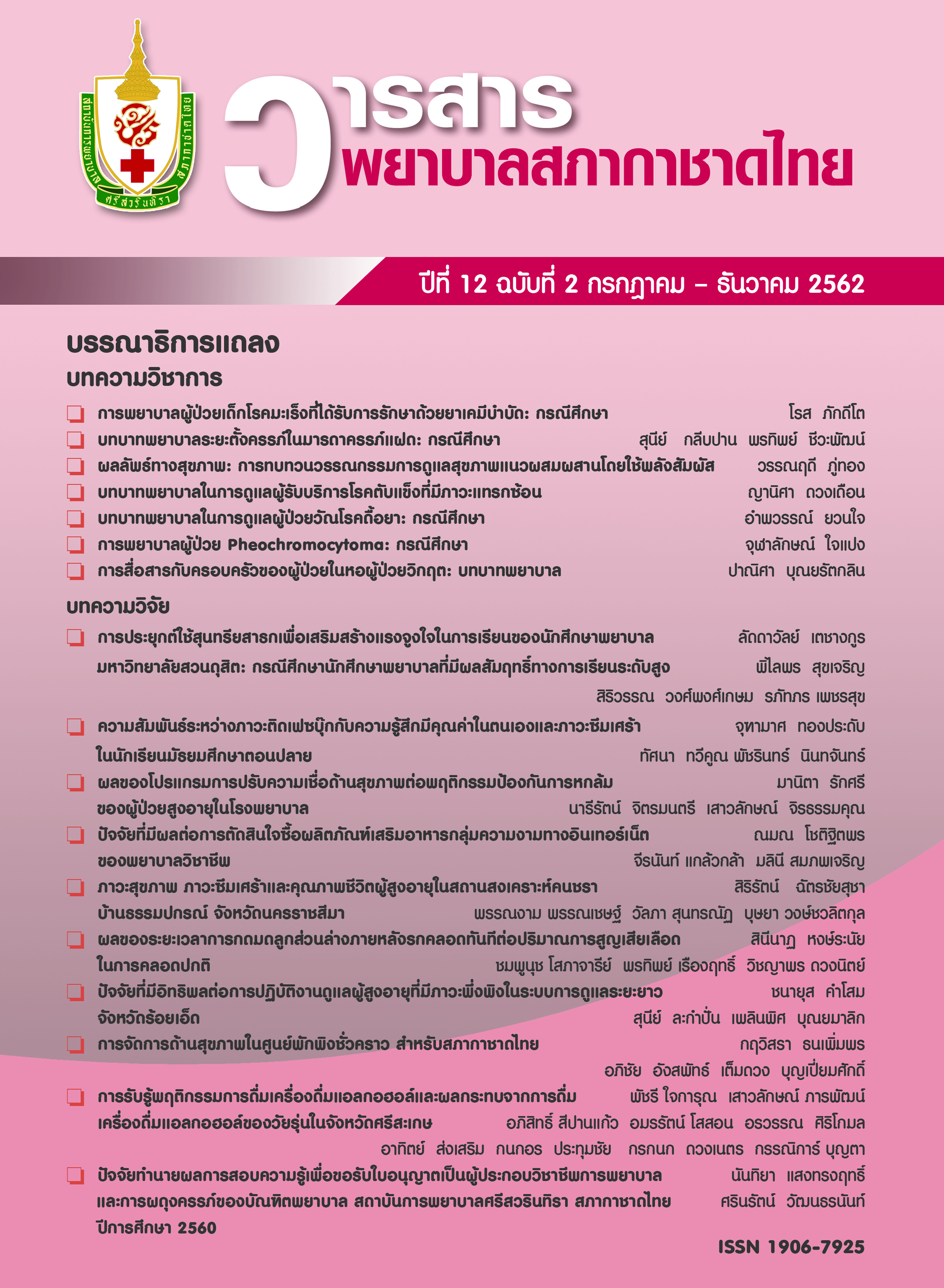Factors Influencing Caring Practices for Dependent Older Adults in the Long Term Care System: Roi Et Province
Keywords:
caregiver, older adult caring, dependent older adult, long term care systemAbstract
The number of dependent older adults in Thailand is increasing leading to the long term care system for dependent older adults by community caregivers. This descriptive research aimed to study the caring practices of caregivers for dependent older adults in the long term care system and its influencing factors in Roi Et province. One hundred eighty caregivers of dependent older adult were randomly selected from 23 pilot areas of Roi Et province. Demographic information and study variables were gathered by interview questionnaires developed by applying the McLeroy’s ecological framework. Data were analyzed by descriptive statistics, Eta, Pearson’s product-moment correlation coefficient, and Stepwise Multiple Regression.
The results revealed that most of the caregivers for dependent older adults in Roi Et province performed caring practices at a good level (98.33%). Considering each dimension, it was revealed that the highest performing was accidental prevention practice (= 9.03, S.D. = 0.85). The lowest performing was mental health caring practice (
= 7.97, S.D. = 1.37). Factors that significantly influenced the caring practice of caregivers for dependent older adults were support from family, occupation as agriculture, recognition from community, female, supervision from case manager, knowledge and attitude toward caring for dependent older adults. All these factors could explain the variation of caring practices for dependent older adults by 64.8% (R2 = .648, p <.001).
The findings suggested that case managers or nurses responsible in the long term care system should consider and apply these influencing factors for building the capacity of caregivers to maintain care for dependent older adults effectively.
References
2. United Nations, Department of Economic and Social Affairs. World population ageing 2015. New York: United Nations, Department of Economic and Social Affairs, Population Division; 2015.
3. Foundation of Thai Gerontology Research and Development Institute. Situation of the Thai elderly 2015 [Internet]. 2016 [cited 2017 Apr 5]. Avilable from: https://www.m-society.go.th/article_attach/16057/19114.pdf (in Thai)
4. Roi Et Provincial Public Health Office. Report of 2nd health government evaluation 2016 Health Area 7. Roi Et: Roi Et Provincial Public Health Office, Depaetment of Stragetegy; 2016. (In Thai)
5. He W, Goodkind D, Kowal P. An aging world: 2015: international population reports. Washington: U.S. Government Publishing Office; 2016.
6. National Academies of Sciences Engineering and Medicine. Families caring for an aging America [Internet]. Washington, DC: The National Academies Press; 2016 [cited 2017 Mar 21 ]. Available from: http://www.johnahartford.org/images/uploads/reports/Family_Caregiving_Report_National_Academy_of_Medicine_IOM.pdf
7. The National Alliance for Caregiving AARP Public Policy Institute. Caregiving in the U.S. 2015 - focused look at caregivers of adults age 50+. n.p.: The National Alliance for Caregiving (NAC) and AARP Public Policy Institute; 2015.
8. Nation Health Security Office. Manual of long term care management in nation health system [Internet]. Bangkok: NHSO; 2016 [cited 2017 Apr 5]. Available from: www.nhso.go.th (in Thai)
9. Tepin W. Bio-social factors associated with geriatric health care behavior by geriatric caregivers. Bangkok: Graduate school of Srinakarinwirot University; 2010. (in Thai)
10. Suwanrada W, Pothisiri W, Siriboon S, Bangkaew B, Milintangul C. Evaluation of the replication project of the elderly home care volunteers. Bangkok: College of Population Studies, Chulalongkorn University; 2014. (in Thai)
11. Muenhor C, Poonpol S. Factors associated with the caregivers, role in caring for the elderly in Nakhon Phanom Province Nakhon Phanom University Journal [Internet]. 2016 [cited 2017 Apr 5];6(1):79-86. Available form: https://www.tci-thaijo.org/index.php/npuj/article/download/53359/44293 (in Thai)
12. Ruejanjob S. Predictors of health care behaviors for the elderly among caregivers in warinchamrap district, ubonratchathani province. Journal of Nursing, Public Health and Education [Internet]. 2016 [cited 2017 Mar 21];17(2):71-84. Available from: https://www.tci-thaijo.org/index.php/bcnpy/article/view/70354 (in Thai)
13. McLeroy K, Daniel B, Allan S, Glanz K. An ecological perspective on health promotion programs. Health Education Quarterly [Internet]. 1988 [cited 2017 Mar 21];15(4):351-77. Available from: https://www.academia.edu/170661/An_Ecological_Perspective_on_Health_Promotion_Programs
14. Bureau of Health Promotion. Manual of 70 hours training for elderly caregiver [Internet]. Bangkok: National Buddha Press; 2013 [cited 2017 Mar 21]; Available form:
http://hp.anamai.moph.go.th/ewt_dl_link.php?nid=419. (in Thai)
15. Srisatitnarakool B. Nursing research methodology. Bangkok: U & I Inter Media Press; 2007. (in Thai)
16. Jang S-N, Avendano M, Kawachi I. Informal Caregiving Patterns in Korea and European Countries: A Cross-National Comparison. Asian Nursing Research 2012;6:19-26.
17. Kroda S. Work-Life conflict in the intermediate age bracket: trends in working hours and time spent caring for elderly family members. Japan Labor Review [Internet]. 2016 [cited Apr 5];33(1):55-72. Available from: http://www.jil.go.jp/english/JLR/documents/2016/JLR49_kuroda.pdf.
18. Lagaé M, Tanguay A, Lavallée M-L, Laplante J, Robichaud S. The silent impact of ageist communication in long term care facilities: elders' perspectives on quality of life and coping strategies. J Aging Stud 2012;26(3):335-42.
19. Izal M, Montorio I, Marquez M, Losada A. Caregivers' expectations and care receivers' competence Lawton's ecological model of adaptation and aging revisited. Arch Gerontol Geriatr 2005;41(2):129-40.
20. Pankong O, Khampeng S. Effects of community-based health promotion program on health-promotion program on health promoting behavior of older persons and satisfaction with the participation of older persons’ caregivers. Rama Nurs J [Internet]. 2553 [cited 2017 Apr 5];16(1):1-13. Available from: https://www.tci-thaijo.org
/index.php/RNJ/article/view/8885 (in Thai)
Downloads
Published
Issue
Section
License
เนื้อหาบทความหรือข้อคิดเห็นต่างๆ ในวารสารพยาบาลสภากาชาดไทยนี้ เป็นความคิดเห็นของผู้เขียนบทความ ไม่ใช่ความเห็นของกองบรรณาธิการ หรือสถาบันการพยาบาลศรีสวรินทิรา สภากาชาดไทย






